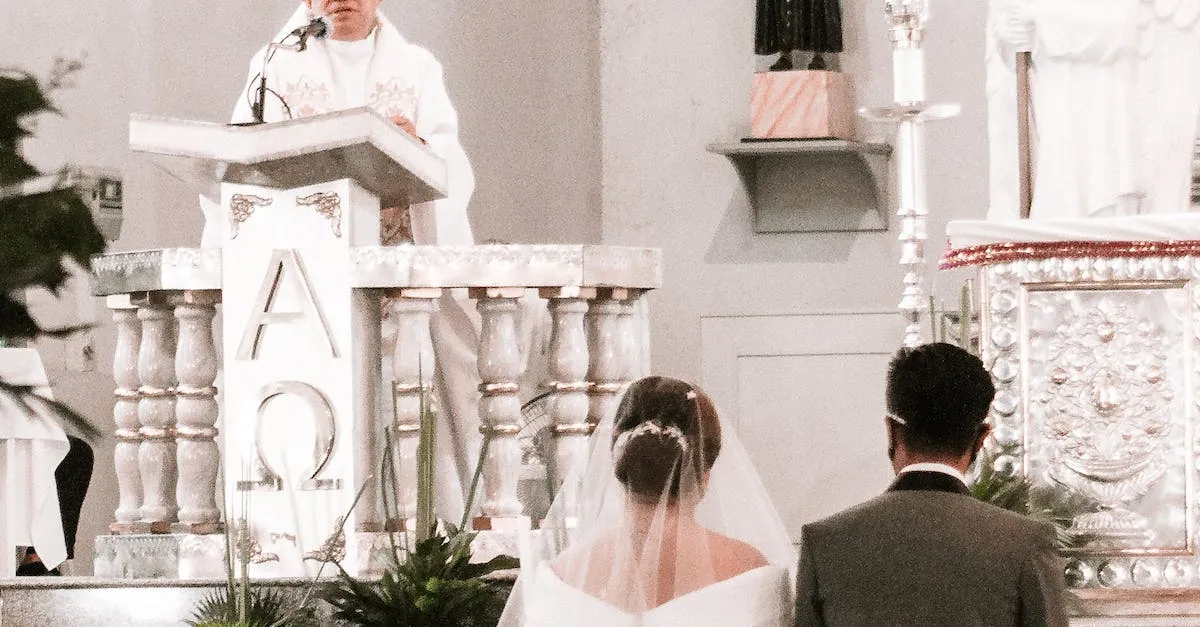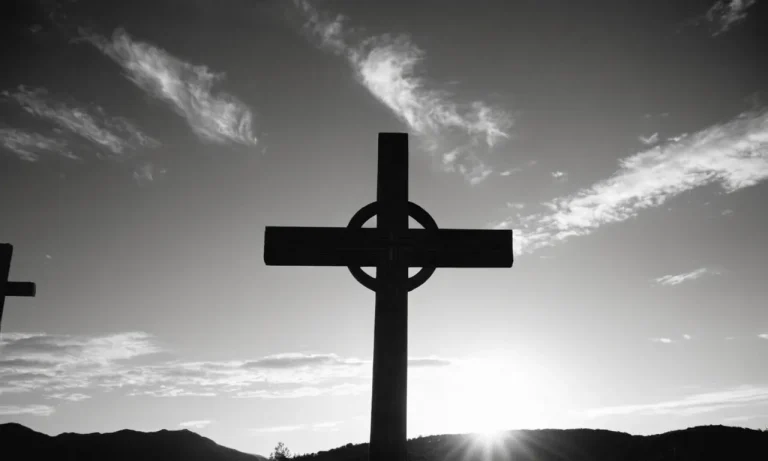Is Marriage A Christian Thing?
Marriage is an institution that predates Christianity, has been practiced by many cultures and religions throughout history, and continues to evolve. However, Christianity has had a major influence on views of marriage in Western civilization.
If you’re short on time, here’s a quick answer to your question: While marriage itself is not exclusively Christian, some of the rituals, beliefs, and practices associated with Christian marriage have shaped how it is viewed and practiced in predominantly Christian cultures.
In this approximately 3000 word article, we will examine the history of marriage practices globally and the origins of Christian marital traditions. We’ll analyze biblical texts about marriage and how Christian theology and doctrine have shaped ideals around gender roles, monogamy, divorce, and sexuality in marriage.
Key differences between Christian and secular perspectives on marriage will be explored. We’ll also look at how marriage has changed in modern times as cultural attitudes have shifted.
The History and Origins of Marriage
Marriage is a social and cultural institution that has been practiced for thousands of years. It has deep roots in various ancient cultures and religions, as well as in the teachings of Christianity. Understanding the history and origins of marriage can provide valuable insights into its significance and role in different societies.
Marriage in Ancient Cultures and Religions
Marriage rituals and customs have varied greatly across different ancient civilizations. In ancient Mesopotamia, for example, marriage was primarily a contractual arrangement between families, aimed at forming alliances or ensuring social and economic stability.
In ancient Egypt, marriage was seen as a way to maintain the order of society and ensure the continuation of family lines.
Similarly, in ancient Greece and Rome, marriage was considered a social and economic institution. It played a significant role in the transfer of property and the preservation of family wealth. In these societies, marriage was often arranged by parents or families, with little consideration given to personal choice or romantic love.
In ancient religions such as Hinduism, marriage was viewed as a sacred union between a man and a woman, symbolizing the harmonious balance of masculine and feminine energies. The Vedas, the oldest Hindu scriptures, contain hymns and rituals associated with marriage, emphasizing its spiritual and divine nature.
Marriage in the Bible and Early Christianity
The institution of marriage holds a central place in the Bible and early Christian teachings. In the Book of Genesis, it is said that God created a man and a woman, Adam and Eve, and established the first marriage.
This biblical account has shaped the understanding of marriage as a sacred bond between a man and a woman in many Christian traditions.
In early Christianity, marriage was considered a holy union blessed by God. The Apostle Paul, in his letters to the Corinthians and the Ephesians, emphasized the importance of marital fidelity and mutual love and respect.
Early Christian communities regarded marriage as a means for spiritual growth and the establishment of a Christian household.
Throughout history, the Christian Church has played a significant role in regulating and solemnizing marriages. Christian marriage ceremonies often involve religious rituals and vows, reinforcing the spiritual and moral commitment between the couple.
It is important to note that while marriage has deep Christian roots, it is not exclusive to Christianity. The institution of marriage predates Christianity and has been practiced in various forms and contexts across different cultures and religions.
To learn more about the history of marriage and its significance in Christianity, you can visit BibleGateway.com, which provides access to different translations of the Bible, including passages related to marriage.
Christian Perspectives on Marriage Roles and Sexuality
Marriage is an integral part of Christian faith and holds a significant place in the lives of believers. Christian perspectives on marriage roles and sexuality are rooted in biblical teachings and shape the way Christians understand and practice their marital relationships.
Gender Complementarity and “Headship”
One important aspect of Christian marriage is the concept of gender complementarity. According to this belief, men and women are created equal but have distinct roles in marriage. This understanding is often based on biblical passages such as Ephesians 5:22-33, which speaks about the husband’s role as the head of the household and the wife’s role of submission.
However, it is important to note that this does not imply superiority or inferiority of one gender over the other. Rather, it emphasizes the importance of mutual respect, love, and support in the marital relationship.
Monogamy and Fidelity
Another fundamental principle in Christian marriage is the commitment to monogamy and fidelity. Christians believe that marriage is a lifelong covenant between one man and one woman, and any form of infidelity or adultery goes against the teachings of the Bible.
The idea of monogamy is supported by passages such as Matthew 19:4-6, where Jesus reaffirms the divine intention for marriage to be between two individuals. Fidelity is seen as a way to honor and protect the sacred bond of marriage, fostering trust and intimacy between spouses.
Sexual Conduct in Christian Marriage
Christian teachings on sexual conduct within marriage emphasize its sacred and intimate nature. The Bible encourages spouses to enjoy a healthy and fulfilling sexual relationship, while also promoting mutual respect and consent.
The apostle Paul wrote in 1 Corinthians 7:3-5 that husbands and wives have a responsibility to meet each other’s sexual needs and to avoid depriving one another. This highlights the importance of open communication, trust, and selflessness in the sexual aspect of Christian marriage.
Divorce
Divorce is a complex and sensitive issue within Christianity. While the Bible acknowledges that divorce may occur in certain circumstances, such as adultery or abandonment, it is generally discouraged.
Christians believe in the sanctity and permanence of marriage, and divorce is seen as a last resort when all attempts at reconciliation have failed. Jesus addressed the issue of divorce in Matthew 19:8-9, stating that it was allowed due to the hardness of people’s hearts, but it was not the original intent for marriage.
However, it is important to approach divorce with compassion and understanding, recognizing that every situation is unique and may require pastoral guidance and support.
For further reading on this topic, you may visit the website Focus on the Family, which provides valuable resources and insights on Christian perspectives on marriage.
The Influence of the Church on Marriage Customs
The church has played a significant role in shaping marriage customs throughout history. From its sacramental status to the wedding ceremonies and rituals, the church has greatly influenced how Christians approach and view marriage.
Sacramental Status
In Christianity, marriage is considered a sacred and sacramental union. It is not just a legal contract, but a covenant before God. The church’s influence on marriage customs is evident in the emphasis placed on the spiritual aspect of the union.
Christians believe that marriage is a reflection of the relationship between Christ and the Church, and it is through this lens that they approach the institution of marriage.
The sacramental status of marriage means that it is seen as a channel of God’s grace. The church recognizes the importance of a strong and committed marriage and provides guidance and support to couples throughout their journey.
This influence can be seen in pre-marital counseling, marriage retreats, and other resources offered by the church to help couples navigate the challenges that come with married life.
Wedding Ceremonies and Rituals
When it comes to wedding ceremonies and rituals, the church has left an indelible mark. Christian weddings often follow a traditional format that includes elements such as exchanging of vows, rings, prayers, and the pronouncement of the couple as husband and wife.
These customs have been passed down through generations and are deeply rooted in religious tradition.
The church’s influence can also be seen in the requirement for a religious officiant to preside over the wedding ceremony. This reinforces the spiritual significance of the union and ensures that the couple receives the church’s blessing on their marriage.
Additionally, many churches have specific guidelines and requirements for couples seeking to get married within their faith tradition. These guidelines may include attending pre-marital counseling, participating in marriage preparation programs, and adhering to certain ethical and moral values.
These requirements not only help couples prepare for marriage but also foster a sense of community and support within the church.
Marriage as a Vocation
In Christian theology, marriage is often regarded as a vocation, a calling from God. This perspective highlights the belief that marriage is not just a personal choice but a divine plan for individuals to live out their faith and serve God through their relationship.
The church’s influence on marriage as a vocation can be seen in the emphasis on selflessness, commitment, and sacrifice within the marital relationship. Christian couples are encouraged to see their marriage as an opportunity to grow in love and holiness, and to serve one another and the greater community.
Furthermore, the church provides resources and support for couples to navigate the challenges that come with married life. This can include marriage enrichment programs, pastoral counseling, and support groups for couples facing difficulties in their relationship.
The church recognizes that a strong and healthy marriage is not only beneficial for the couple but also for society as a whole.
Changing Cultural Attitudes and the Evolution of Marriage
Marriage, once considered a sacred union between a man and a woman, has undergone significant changes in recent years. As society evolves, cultural attitudes towards marriage have shifted, reflecting the changing values and beliefs of the modern world.
This article explores the various factors that have contributed to the transformation of marriage.
Rise of Secularization
One of the key factors influencing the evolution of marriage is the rise of secularization. As societies become increasingly secular, religious institutions have less influence over the definition and practice of marriage.
People are now more likely to approach marriage from a secular perspective, considering it as a legal and emotional commitment rather than a religious sacrament. This shift has opened the door for alternative forms of marriage and diverse interpretations of what constitutes a valid union.
Changing Gender Roles
The changing roles of men and women in society have also played a significant role in reshaping the institution of marriage. With the advancement of gender equality, traditional gender roles have become less rigid. Women are now pursuing careers, and men are taking on more household responsibilities.
This shift has led to a reevaluation of the traditional marital dynamic, with couples seeking partnerships based on mutual respect and shared responsibilities rather than traditional gender roles.
Acceptance of Divorce and Remarriage
Another factor that has contributed to the evolution of marriage is the increased acceptance of divorce and remarriage. In the past, divorce was stigmatized and seen as a failure. However, changing societal attitudes have led to a greater understanding and acceptance of the fact that not all marriages are meant to last.
Divorce has become more common and less taboo, allowing individuals to break free from unhappy or unhealthy marriages and seek new opportunities for love and companionship.
Same-Sex Marriage
The legalization and acceptance of same-sex marriage has been a pivotal moment in the evolution of marriage. Once considered taboo, same-sex relationships are now recognized and celebrated in many countries around the world.
This shift in societal attitudes has challenged the traditional definition of marriage as solely between a man and a woman. Same-sex couples have fought for equal rights and the recognition of their love and commitment, leading to a reevaluation of what it means to be married.
Conclusion
While marriage has ancient origins and is practiced cross-culturally, Christian theology and church traditions have had a significant influence on the institution of marriage in the Western world. However, as society has become more secular and egalitarian, cultural attitudes about gender, sexuality, and the role of marriage have shifted.
The definition and practice of marriage continues to adapt and change.








